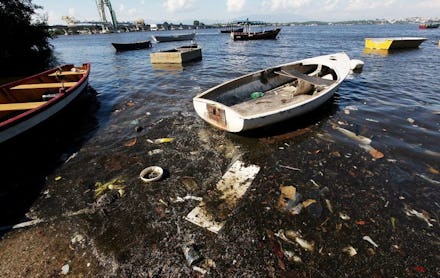In 2016, Olympians Will Compete Against Sewage, Dead Dogs and Industrial Pollution

The news: Guanabara Bay, the site of the sailing competitions for the 2016 Summer Olympics in Rio, will not be ready in time for competition, the city's mayor Eduardo Paes admitted this past weekend.
Instead, sailors can expect to compete in waters variously described as a "cesspit," a "dump," and "really disgusting, with dog carcasses in some places and the water turning brown from sewage contamination." One Brazilian sailor who trains in the bay told the New York Times that he hit what was most likely a couch during a practice session and capsized his boat.
Rio's Guanabara Bay is choked with human waste, garbage and industrial pollution from one of the world's largest and most economically stratified cities. "I've never seen anything like this before," Australian sailor Nico Delle Karth told the Times.
Image Credit: Getty
While officials have made progress, they're already admitting that they will fall far short of the 80% pollution treatment target promised. The Associated Press published what they claimed to be a letter from Rio's state environmental secretary, Carlos Francisco Portinho, telling sports minister Aldo Rebelo that increased funding could allow them to cut "over 50%" of the pollution flowing into the bay, well below promises.
"I am sorry that we didn't use the games to get Guanabara Bay completely clean, but that wasn't for the Olympic Games — that was for us. That was something that we could not accomplish that was in the bid book," Paes reportedly said over the weekend. He also insists the sailing competition will nonetheless be held in unpolluted waters. But nearly 70% of Rio's sewage goes untreated into the bay, meaning even a garbage cleanup will only cover up the bay's pollution.
"Welcome to the dump that is Rio," the German sailing team announced, pointing to mounds of trash washing up on a race courses.
Image Credit: Getty
Trouble in Rio: This news comes just five weeks after International Olympic Committee Vice President John D. Coates told international media that Brazil's 2016 preparations were "the worst [he's] ever experienced."
"We've become very concerned, to be quite frank," he reportedly during an Olympic forum in Sydney. "They really are not ready in many, many ways."
But no matter what, Coates says, the IOC is committed to Brazil. "There can be no Plan B; we are going to Rio," Coates told the New York Times.
"We've just got to make sure that we help the organizing committee deliver games that will enable our athletes, the athletes of the world, to perform to the best of their ability," he said.
Other problems include the unconstructed Deodoro sports complex, which is expected to host 11 events and is behind schedule, as well as labor unrest and the human rights situation as a result of the "pacification" of social undesirables.
Image Credit: Getty
Why you should care: Criticism has surrounded host choices for international sporting events lately, with Brazil and Qatar being lambasted for poor planning and horrifying treatment of guest workers and displaced locals. Qatar is on track to kill 4,000 guest workers by the time preparations for the 2022 World Cup are finished. CBS Sports' Gregg Doyel blatantly accused Cup officials of having taken bribes to justify hosting the event the wildly corrupt, heat-blasted absolute monarchy.
In Brazil, police are violently suppressing riots, strikes and protests as the World Cup comes to a start this week, and the unrest is serious enough that the government plans to deploy 100,000 police and 57,000 soldiers to secure arenas. The "pacification" program may suppress street crime during the events, but came with systemic police brutality.
While the program initially focused on community policing and improving access to public services, it is now, according to World Politics Review:
"Increasingly focused on containing violence through more intensive and militarized policing. Such a strategy will not reduce violence in the long term and cannot effectively combat the drug-trafficking gangs. The drug factions rely on the tacit if not outright support of favela communities, and a more brutal and oppressive police force will only strengthen local gang factions by sewing distrust in the pacification project itself."
Against these problems, a filthy bay may seem downright inconsequential. But after the events (and the money) leave, locals will be stuck with it for much longer than the athletes.
"The government could deploy aircraft carriers to collect the bay's garbage and the problem would not be solved," biologist Mario Moscatelli told the New York Times. "The bay is still a latrine. It's an insult to Rio's people to say it will be clean for the Olympics."